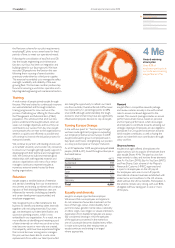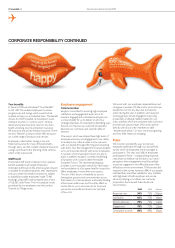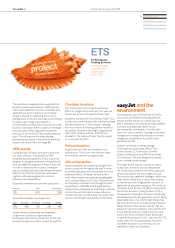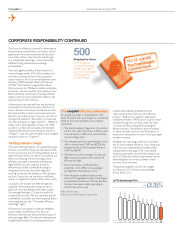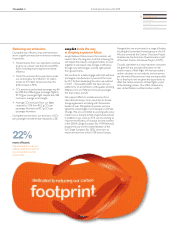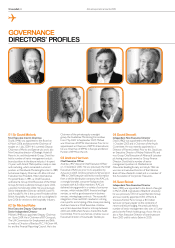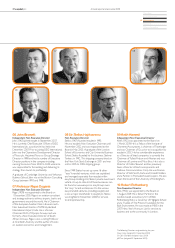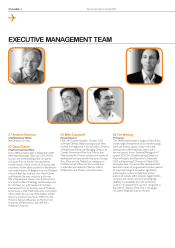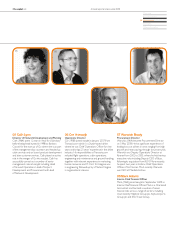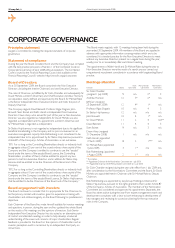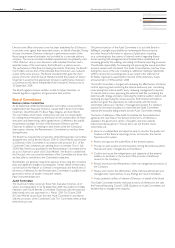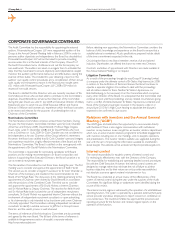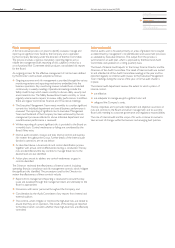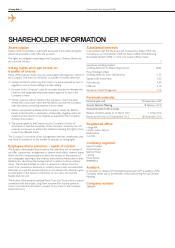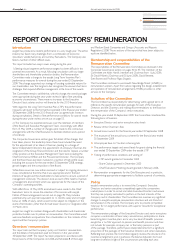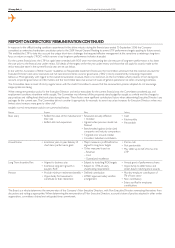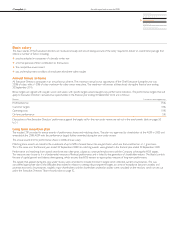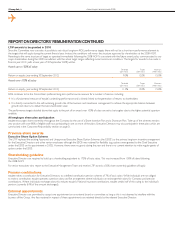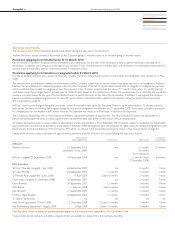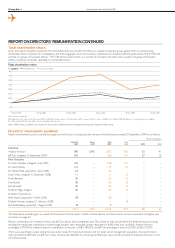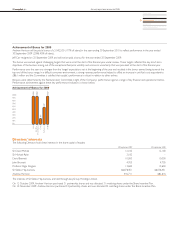EasyJet 2009 Annual Report Download - page 43
Download and view the complete annual report
Please find page 43 of the 2009 EasyJet annual report below. You can navigate through the pages in the report by either clicking on the pages listed below, or by using the keyword search tool below to find specific information within the annual report.
41 easyJet plc Annual report and accounts 2009
Directors and officers insurance cover has been established for all Directors
to provide cover against their reasonable actions on behalf of easyJet. During
the year, the Interim Chairman undertook a performance review of the
Board using an external evaluation tool provided by a corporate advisory
company. The process involved a detailed questionnaire completed by each
of the Directors, one on one discussions with individual Directors and a
separate review of the outcome by the full Board in a plenary session.
The performance of the Board (including the Interim Chairman), the Board’s
Committees and also that of the individual Board Directors was reviewed
as part of the same process. The Board considered that given the short
period of time for which Sir David Michels had held the position of Interim
Chairman it would not be appropriate to have his performance reviewed
as Chairman by the Senior Independent Non Executive Director prior to
30 September 2009.
The Board regularly receives updates, via the Company Secretary, on
relevant legislation, regulation and governance best practice.
Board Committees
Remuneration Committee
At 30 September 2009, the Remuneration Committee comprised four
Independent Non Executive Directors, namely Keith Hamill (Committee
Chairman), David Bennett, Professor Rigas Doganis, and Sven Boinet.
This Committee, which meets at least twice per year, has responsibility
for making recommendations to the Board on the compensation of senior
executives and determining, within agreed terms of reference, the specific
remuneration packages for each of the Executive Directors and the
Chairman. In addition to meetings to allot shares under the Company’s
share option schemes, the Remuneration Committee has met four times
during the year.
The Board has reviewed the composition of the Remuneration Committee
during the year and at the end of June 2009, Sir David Michels stood down
as Chairman of the Committee in accordance with provision B.2.1 of the
Combined Code, simultaneously standing down as member. From 1 July
2009, Keith Hamill was appointed to the Remuneration Committee and to
act as its Chairman in place of Sir David Michels. The Board is satisfied that
the Directors who are currently members of this Committee are those who
are best able to contribute to the Committee’s objectives.
Shareholders are generally required to approve all new long term incentive
plans and significant changes to existing plans. Further details of these plans
can be found in the Report on Directors’ remuneration and the full text of
the terms of reference for the Remuneration Committee is available in the
governance section of easyJet’s corporate website,
http://corporate.easyJet.com.
Audit Committee
The Audit Committee comprises three Non Executive Directors, all of
whom are independent. As at 30 September 2009, the Audit Committee
members were David Bennett (Committee Chairman), John Browett and
Keith Hamill, who was appointed on 1 March 2009. On 30 June 2009
Sir David Michels stood down from the Audit Committee in accordance
with the provisions of the Combined Code. This Committee meets at least
three times per year.
The primary function of the Audit Committee is to assist the Board in
fulfilling its oversight responsibilities by reviewing the financial reports
and other financial information in advance of publication, reviewing
on a continuing basis the systems of internal controls regarding finance
and accounting that management and the Board have established and
reviewing generally the auditing, accounting and financial reporting processes.
The ultimate responsibility for reviewing and approving the annual and other
accounts remains with the Board. The Audit Committee has met four times
during the course of the year, including an additional meeting in September
2009 to review the accounting policy issues raised in the statement of
Sir Stelios Haji-Ioannou appended to the end of the preliminary results
announcement of 18 November 2008.
The Audit Committee is charged with reviewing the effectiveness of internal
control, approving and monitoring the internal audit work plan, considering
issues arising from internal audit’s work, reviewing management’s response
to internal control issues, approving the external audit fee, considering the
external audit strategy and plans, reviewing the external auditors’ reports and
reviewing and approving the annual accounts. Both internal and external
auditors are given the opportunity to meet privately with the Audit
Committee without any member of management present. It is standard
practice for the external auditors to meet with the Audit Committee
without the executive being present at each Audit Committee meeting.
The terms of reference of the Audit Committee are documented and
agreed by the main Board. The full text of the terms of reference is
available in the governance section of easyJet’s corporate website,
http://corporate.easyJet.com. The key terms set out that the Audit
Committee will:
Serve as an independent and objective party to monitor the quality and
timeliness of the financial reporting process and monitor the internal
financial control system
Review and appraise the audit efforts of the external auditors
Provide an open avenue of communication among the external auditors,
financial and senior management, and the Board
Confirm and assure the independence and objectivity of the external
auditors (in particular, in the context of the provision of additional
services to the Company)
Review and ensure the effectiveness of the risk management processes of
the Company
Review and monitor the effectiveness of the internal audit function and
management’s responsiveness to any findings and recommendations
Assess potential conflicts of interest of Directors on behalf of the Board
The Audit Committee recently reviewed its terms of reference in line with
the Financial Reporting Council’s 2008 Guidance on Audit Committees and
decided that no changes were required.


